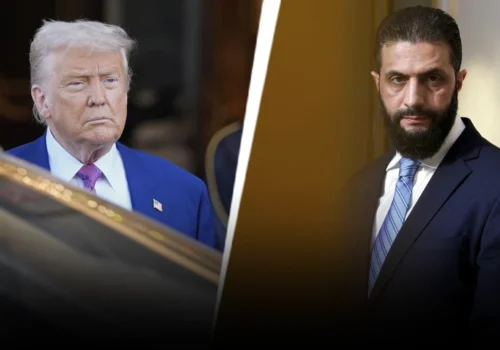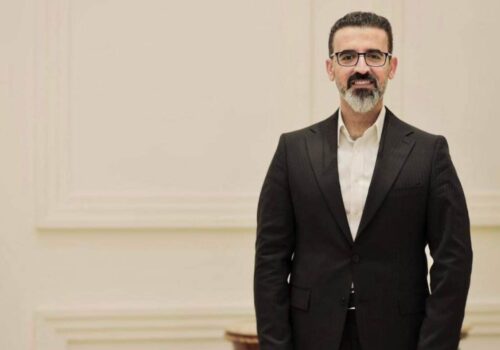Syria’s return to the Arab League is considered by many to be a positive development for Damascus. Indeed, the conditional return of the Assad-led regime to the Arab League is promising for Damascus. However, it does not face a completely positive picture with the regime. However, there is not a completely favorable picture for the Assad regime.
The clearest statement on Damascus’ return to the Arab League came from the Secretary General of the Arab League, Ahmed Abu Gheit. This statement painted a clear picture of the Arab League’s position.
In his statement, Gheit said that Syria’s return to the Arab League does not mean that all members will re-establish full relations with Assad’s Syria and described Damascus’ admission to the Union as an Arab effort to facilitate a political solution to the crisis in Syria. From this viewpoint, Syria’s return to the Arab League corresponds to an invitation for a political solution, which Assad and the Ba’ath did not favour.
At the same time, there is a parallel between the meetings Turkey has been holding for some time, first at the level of the intelligence agencies, then the defence ministers, and finally the foreign ministry, and Syria’s conditional return to the Arab League.
One of the consequences of the Great power competition
However, even if it is possible to define the architect of this harmony as both Turkey’s changing security concept and the flexible policy steps of the Arab states in the last few years, it should not be overlooked that the main ground for this harmony is the rising Chinese influence in the face of the decline of the US power in the Middle East in the regional sense.
It is no coincidence that immediately after China’s successful mediation between Iran and Saudi Arabia, Arab countries took successive steps in their relations with Assad, moving from intentions to practice. A few days after the deal with Iran, the Saudis announced the restoration of diplomatic relations with the Syrian government, and Assad traveled successively to Oman and the UAE. Indeed, despite the US pressure on the region to isolate Damascus, Assad has slowly but surely re-emerged on the diplomatic scene.
Despite the major defeat in its attempt to invade Ukraine, Russia has managed to maintain the diplomatic framework in Syria, which is dependent on military power, with the help of Turkey’s changing Syria concept in the summer of 2016. Simultaneously, China’s political influence on a regional basis through its growing capital power has been the main architect of the change in the approach to Syria.
The policy of avoiding direct military confrontation between China and the US has led Beijing to act in the Middle East not as a security actor but as a soft power actor seeking to protect its investments. This strategy has been quite successful so far and has been useful for Beijing to consolidate its power in the region.
Recently leaked US intelligence documents underlined this situation: Egypt was trying to supply Russia with munitions, the UAE was sharing intelligence with Russia, and the Saudis were beginning to favour Chinese companies for contracts in their battle with the UAE for Arab leadership. China’s growing economic influence in the region is not surprisingly a lever with political consequences, and regional stabilization for Beijing’s Belt and Road dominance means more Chinese investment in the Gulf states.

During this whole process, Arab states were signaling their relations with the Damascus regime. The US, on the other hand, has been trying to intervene in this situation from time to time with statements against normalization with the Assad regime. However, these warnings do not seem to have worked.
Or at least the Arab states, in spite of the US, were able to decide to use the Arab League as a platform, even if only to mitigate the problems arising from the Syrian regime, which has become a narco-state, a regional centre of drug trafficking. Statements by Arab League Secretary-General Gheit and his deputy Husam Zaki emphasised these issues, while Jordan’s secret document, which was leaked to the media and presented separately to Joe Biden and Putin, called for a step-by-step strategy to stop the drug trade spread to region from Damascus.
At the end of the day, for all the above reasons, declarations of political victory over the Arab League’s invitation to Assad seem rather premature.
The US is aware that its influence over the Arab states in the balance of power in the Middle East is diminishing. Joe Biden’s words – The US is not going anywhere – were like a confession of this situation. However, the US still has the apparatus to block the Arab states in Syria. Husam Zaki, the deputy secretary general of the Arab League, said that Arab states would not challenge the US on the reconstruction of Syria. In short, although the Arab League has partially resumed relations with the Assad-led Damascus regime under various conditions and with the theme of a political solution, they are trying to maintain a delicate balance with regard to US sanctions.
Considering the objections of some members of the Arab League and the US attitude, it seems unlikely that the Damascus administration will receive financial support under the name of reconstruction, especially from the Gulf countries in the short term. A bill is being prepared in the US against the normalization of the Assad regime, even though the Arab states and partly Turkey have different motives and background dynamics. This bill, which envisages extending the sanctions imposed by the US against the Assad regime in the field of normalization, seems to have already pushed the regional Arab allies of the US to a position of hesitation.
However, even if the United States extends sanctions to the area of normalization, Arab states will not care about sanctions once the Iranian-Saudi deal begins to bear fruit through China’s expanding investment, i.e. as China’s regional economic network becomes entrenched and flourishes. When the gap between the decline in US trade with the Middle East and the proportionally rising China widens for Washington, sanctions will no longer be relevant for the Arab states.
At the very least, the Arab League’s action on Syria is not an action taken by the Arab states in a timely manner through consultations among themselves on a firm basis. It is one of the early results of a round of the great power competition.
Arab activism: Turkey could be the target
It is highly likely that there will be minor Syria-centred crises within the Arab League or between individual Arab countries and Turkey. This is because all the statements made before the Arab League meeting referred to the Arab ‘return’ to Syria, while Iran’s presence in Syria was ignored.
However, the statements that Arabs have left behind the period when the Arab role in Syria was marginalized and weakened and that opened a new chapter in which the Arab role is more active, point to the risk of Turkey facing a bloc. It will not be long before the Arab states, following China’s advice to the Saudis and ignoring Iran’s presence in Syria, equate Turkey with the definition of a foreign power in Syria. As Arab League spokespersons have stated, the Arabs are not yet ready to confront the United States. The Arab League, which has frequently targeted Turkey in the past, is likely to make more frequent and harsh statements against the Turkish presence in Syria in order to maintain a balance with the US.
It is quite possible that this situation will create a useful bloc for Russia and the US against Turkey’s operations in Syria under the concept of counterterrorism. However, Turkey’s rapid withdrawal from Syria does not seem to be a situation that Damascus would prefer.
The Assad regime, which has re-established a dialogue with Turkey through the Astana and Moscow processes, does not have the power to take back the regions held by the terrorist organization YPG. Likewise, it does not have the capacity to use military force against the US presence in Syria. A similar situation is also valid for Moscow. Moscow would prefer to turn a blind eye to Ankara’s coercive operations against the US rather than directly confronting the US in Syria. This is partly what has happened so far.
Apart from these issues, a rapid withdrawal from Syria would also have severe and protracted consequences for Turkey, which would lose one of its most important cards in the fight against terrorism, namely the ability to conduct operations against YPG areas in order to build safe zones for the return of refugees. This would mean that both the issue of refugee return and the YPG issue would remain unresolved for Turkey, and Ankara would have to deal with two fundamental problems domestically along its southern border.
Turkey may have to intensify its diplomatic and military steps to achieve quick results in Syria, while somehow aligning the Arab states on Iran and Syria in order to organise the lower layers of China’s Belt and Road project.







You have remarked very interesting points! ps decent web site.
I have been checking out a few of your articles and it’s pretty good stuff. I will make sure to bookmark your site.
BWER is Iraq’s go-to provider for weighbridges, ensuring durability, accuracy, and cost-efficiency in all weighing solutions, backed by exceptional customer support and maintenance services.
https://www.tellern.com Telegram应用是开源的,Telegram下载的程序支持可重现的构建。Telegram同时适用于以下环境:Android安卓端,iPhone 和 iPad及MacOS的Apple端,Windows/Mac/Linux桌面版
F*ckin¦ tremendous things here. I¦m very happy to peer your article. Thanks so much and i am taking a look forward to touch you. Will you please drop me a e-mail?
Hello! This is my 1st comment here so I just wanted to give a quick shout out and tell you I truly enjoy reading through your posts. Can you suggest any other blogs/websites/forums that cover the same topics? Thanks!
I’m not that much of a internet reader to be honest but your blogs really nice, keep it up! I’ll go ahead and bookmark your website to come back down the road. Cheers
I am really enjoying the theme/design of your blog. Do you ever run into any web browser compatibility problems? A couple of my blog readers have complained about my blog not operating correctly in Explorer but looks great in Chrome. Do you have any ideas to help fix this problem?
I’ll right away take hold of your rss as I can’t find your e-mail subscription hyperlink or newsletter service. Do you have any? Please let me recognise in order that I may just subscribe. Thanks.
Hi there! Do you use Twitter? I’d like to follow you if that would be okay. I’m absolutely enjoying your blog and look forward to new updates.
Outstanding post, you have pointed out some wonderful details , I as well think this s a very wonderful website.
It’s a shame you don’t have a donate button! I’d definitely donate to this outstanding blog! I suppose for now i’ll settle for bookmarking and adding your RSS feed to my Google account. I look forward to brand new updates and will talk about this website with my Facebook group. Chat soon!
hey there and thanks for your info – I have definitely picked up something new from proper here. I did on the other hand expertise a few technical points using this site, since I experienced to reload the site many instances prior to I may just get it to load properly. I have been puzzling over in case your hosting is OK? Now not that I’m complaining, but sluggish loading circumstances occasions will sometimes have an effect on your placement in google and could damage your quality rating if advertising and ***********|advertising|advertising|advertising and *********** with Adwords. Anyway I’m including this RSS to my email and could look out for a lot extra of your respective fascinating content. Make sure you update this again soon..
I’m still learning from you, as I’m making my way to the top as well. I absolutely enjoy reading all that is posted on your blog.Keep the stories coming. I liked it!
I am not real wonderful with English but I come up this really leisurely to read .
I have been exploring for a little for any high quality articles or blog posts on this kind of house . Exploring in Yahoo I eventually stumbled upon this web site. Reading this information So i’m satisfied to express that I have an incredibly just right uncanny feeling I found out exactly what I needed. I so much indisputably will make sure to do not disregard this site and provides it a glance regularly.
Utterly composed content, Really enjoyed studying.
Do you have a spam problem on this blog; I also am a blogger, and I was wanting to know your situation; many of us have created some nice methods and we are looking to trade techniques with other folks, please shoot me an e-mail if interested.
Very interesting subject, thank you for putting up.
Good post. I be taught one thing more difficult on completely different blogs everyday. It is going to at all times be stimulating to read content material from different writers and apply a bit one thing from their store. I’d choose to use some with the content on my weblog whether you don’t mind. Natually I’ll provide you with a link in your internet blog. Thanks for sharing.
The very crux of your writing while appearing reasonable initially, did not work well with me after some time. Somewhere within the sentences you actually managed to make me a believer unfortunately just for a while. I still have a problem with your leaps in assumptions and you would do nicely to fill in those gaps. In the event that you actually can accomplish that, I could certainly be amazed.
Its excellent as your other content : D, appreciate it for posting.
Awsome info and right to the point. I don’t know if this is in fact the best place to ask but do you guys have any thoughts on where to employ some professional writers? Thanks in advance 🙂